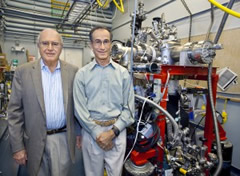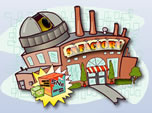


The wait is over. The first of five Carbon Smackdown matches launches today at noon in the Building 50 Auditorium. Grab your lunch and learn how efficient cookstoves for the developing world — from Darfur to Ethiopia and beyond — are reducing carbon dioxide emissions, saving forests, and improving health. Ashok Gadgil, Kayje Booker, and Adam Rausch will discuss why they got started in this great challenge and what’s next. They’ll also answer your questions.
Can’t leave your desk at noon? We’ve got you covered with a live webcast. Check out the complete line-up of matches pitting Berkeley Lab scientists against carbon dioxide.
If you crave even more information on efficient cookstoves, check out this feature article posted yesterday in Berkeley Lab’s News Center. It explores how Berkeley Lab scientists are customizing the Darfur stove to work in Ethiopia, and how they’re applying lessons learned to Haiti.
 When it comes to metal catalysts, the platinum standard is, well, platinum. However, at about $2,000 an ounce, platinum is more expensive than gold. The high cost of the raw material presents major challenges for the future wide scale use of platinum in fuel cells. Berkeley Lab research suggests that one possible way to meet these challenges is to think small – really small. A study led by Gabor Somorjai (left) and Miquel Salmeron of the Materials Sciences Division showed that under high pressure, nanoparticle clusters of platinum potentially can out-perform the single crystals of platinum now used in fuel cells and catalytic converters. More
When it comes to metal catalysts, the platinum standard is, well, platinum. However, at about $2,000 an ounce, platinum is more expensive than gold. The high cost of the raw material presents major challenges for the future wide scale use of platinum in fuel cells. Berkeley Lab research suggests that one possible way to meet these challenges is to think small – really small. A study led by Gabor Somorjai (left) and Miquel Salmeron of the Materials Sciences Division showed that under high pressure, nanoparticle clusters of platinum potentially can out-perform the single crystals of platinum now used in fuel cells and catalytic converters. More
 Do you volunteer in the community? Are there specific volunteer activities that you would like the Lab to provide? Help the Public Affairs Department learn about the volunteer work employees are involved in by taking this five-minute survey. The results will help the Public Affairs Department align the humanitarian spirit of the Lab with causes and organizations that closely relate to Berkeley Lab’s problem-solving mission.
Do you volunteer in the community? Are there specific volunteer activities that you would like the Lab to provide? Help the Public Affairs Department learn about the volunteer work employees are involved in by taking this five-minute survey. The results will help the Public Affairs Department align the humanitarian spirit of the Lab with causes and organizations that closely relate to Berkeley Lab’s problem-solving mission.
 A team of researchers from Berkeley Lab has received the Best Paper Award at ScienceCloud 2010, the first Workshop on Scientific Cloud Computing sponsored by the Association for Computing Machinery. The paper, “Seeking Supernovae in the Clouds: A Performance Study,” was written by Keith Jackson and Lavanya Ramakrishnan of the Advanced Computing for Science Department, Karl Runge of the Physics Division, and Rollin Thomas of the Computational Cosmology Center. More
A team of researchers from Berkeley Lab has received the Best Paper Award at ScienceCloud 2010, the first Workshop on Scientific Cloud Computing sponsored by the Association for Computing Machinery. The paper, “Seeking Supernovae in the Clouds: A Performance Study,” was written by Keith Jackson and Lavanya Ramakrishnan of the Advanced Computing for Science Department, Karl Runge of the Physics Division, and Rollin Thomas of the Computational Cosmology Center. More
![]() Researchers from across the Lab have developed free or open-source software that is available to the general public for downloading. According to statistics compiled by the Lab’s Technology Transfer and Intellectual Property Management department, total downloads for fiscal year 2009 topped 119,000, more than double the number of downloads from the previous fiscal year. Energy-efficiency software from the Environmental Energy Technologies Division was the most popular, accounting for about 80 percent of the downloads.
Researchers from across the Lab have developed free or open-source software that is available to the general public for downloading. According to statistics compiled by the Lab’s Technology Transfer and Intellectual Property Management department, total downloads for fiscal year 2009 topped 119,000, more than double the number of downloads from the previous fiscal year. Energy-efficiency software from the Environmental Energy Technologies Division was the most popular, accounting for about 80 percent of the downloads.
Today
at Berkeley Lab encourages feedback and story ideas
Deadline for submissions is 10 a.m. two days prior to publication
TABL is produced by Public Affairs' Communications Group